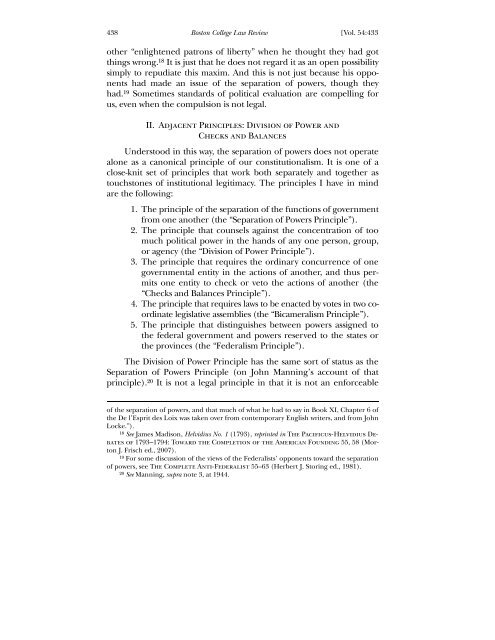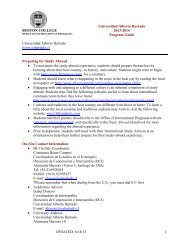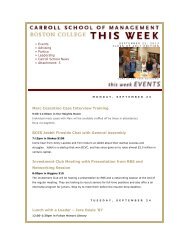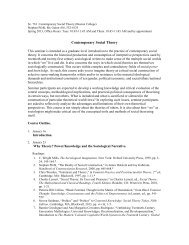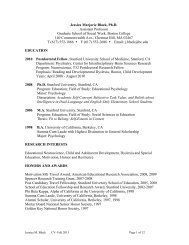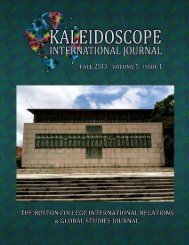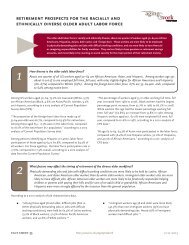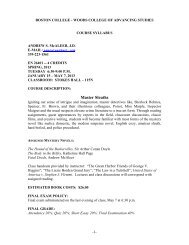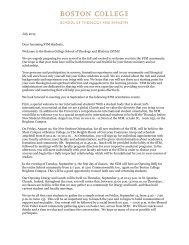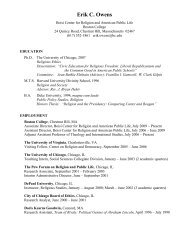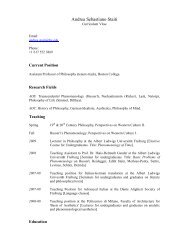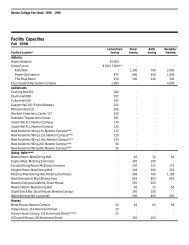separation of powers in thought and practice? - Boston College
separation of powers in thought and practice? - Boston College
separation of powers in thought and practice? - Boston College
Create successful ePaper yourself
Turn your PDF publications into a flip-book with our unique Google optimized e-Paper software.
438 <strong>Boston</strong> <strong>College</strong> Law Review [Vol. 54:433<br />
other “enlightened patrons <strong>of</strong> liberty” when he <strong>thought</strong> they had got<br />
th<strong>in</strong>gs wrong.18 It is just that he does not regard it as an open possibility<br />
simply to repudiate this maxim. And this is not just because his opponents<br />
had made an issue <strong>of</strong> the <strong>separation</strong> <strong>of</strong> <strong>powers</strong>, though they<br />
had.19 Sometimes st<strong>and</strong>ards <strong>of</strong> political evaluation are compell<strong>in</strong>g for<br />
us, even when the compulsion is not legal.<br />
II. Adjacent Pr<strong>in</strong>ciples: Division <strong>of</strong> Power <strong>and</strong><br />
Checks <strong>and</strong> Balances<br />
Understood <strong>in</strong> this way, the <strong>separation</strong> <strong>of</strong> <strong>powers</strong> does not operate<br />
alone as a canonical pr<strong>in</strong>ciple <strong>of</strong> our constitutionalism. It is one <strong>of</strong> a<br />
close-knit set <strong>of</strong> pr<strong>in</strong>ciples that work both separately <strong>and</strong> together as<br />
touchstones <strong>of</strong> <strong>in</strong>stitutional legitimacy. The pr<strong>in</strong>ciples I have <strong>in</strong> m<strong>in</strong>d<br />
are the follow<strong>in</strong>g:<br />
1. The pr<strong>in</strong>ciple <strong>of</strong> the <strong>separation</strong> <strong>of</strong> the functions <strong>of</strong> government<br />
from one another (the “Separation <strong>of</strong> Powers Pr<strong>in</strong>ciple”).<br />
2. The pr<strong>in</strong>ciple that counsels aga<strong>in</strong>st the concentration <strong>of</strong> too<br />
much political power <strong>in</strong> the h<strong>and</strong>s <strong>of</strong> any one person, group,<br />
or agency (the “Division <strong>of</strong> Power Pr<strong>in</strong>ciple”).<br />
3. The pr<strong>in</strong>ciple that requires the ord<strong>in</strong>ary concurrence <strong>of</strong> one<br />
governmental entity <strong>in</strong> the actions <strong>of</strong> another, <strong>and</strong> thus permits<br />
one entity to check or veto the actions <strong>of</strong> another (the<br />
“Checks <strong>and</strong> Balances Pr<strong>in</strong>ciple”).<br />
4. The pr<strong>in</strong>ciple that requires laws to be enacted by votes <strong>in</strong> two coord<strong>in</strong>ate<br />
legislative assemblies (the “Bicameralism Pr<strong>in</strong>ciple”).<br />
5. The pr<strong>in</strong>ciple that dist<strong>in</strong>guishes between <strong>powers</strong> assigned to<br />
the federal government <strong>and</strong> <strong>powers</strong> reserved to the states or<br />
the prov<strong>in</strong>ces (the “Federalism Pr<strong>in</strong>ciple”).<br />
The Division <strong>of</strong> Power Pr<strong>in</strong>ciple has the same sort <strong>of</strong> status as the<br />
Separation <strong>of</strong> Powers Pr<strong>in</strong>ciple (on John Mann<strong>in</strong>g’s account <strong>of</strong> that<br />
pr<strong>in</strong>ciple).20 It is not a legal pr<strong>in</strong>ciple <strong>in</strong> that it is not an enforceable<br />
<strong>of</strong> the <strong>separation</strong> <strong>of</strong> <strong>powers</strong>, <strong>and</strong> that much <strong>of</strong> what he had to say <strong>in</strong> Book XI, Chapter 6 <strong>of</strong><br />
the De l’Esprit des Loix was taken over from contemporary English writers, <strong>and</strong> from John<br />
Locke.”).<br />
18 See James Madison, Helvidius No. 1 (1793), repr<strong>in</strong>ted <strong>in</strong> The Pacificus-Helvidius Debates<br />
<strong>of</strong> 1793–1794: Toward the Completion <strong>of</strong> the American Found<strong>in</strong>g 55, 58 (Morton<br />
J. Frisch ed., 2007).<br />
19 For some discussion <strong>of</strong> the views <strong>of</strong> the Federalists’ opponents toward the <strong>separation</strong><br />
<strong>of</strong> <strong>powers</strong>, see The Complete Anti-Federalist 55–63 (Herbert J. Stor<strong>in</strong>g ed., 1981).<br />
20 See Mann<strong>in</strong>g, supra note 3, at 1944.


